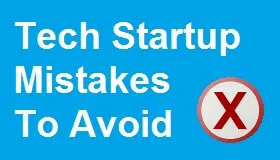Few Mistakes To Avoid In A Tech Startup

During my work in different software development companies, I have come across three stages of leadership. I count them as evolution of a Startup to become a big organization. Some startups survive such changes and successfully step up to the next stage while others fail. My comments below could be limited to what I have experienced and may not cover every possible life cycle of a startup.Normally startups are launched with a technical product where folks forming the core team of the company are highly technical themselves. They do development, recruitment, finance, marketing and every other bit of work, necessary to pull a company. Being developers at heart, an excitement around the technology is what drives the organization. Selling of the product lags if none of the co-founders holds required experience in marketing and selling the product. Angel funding is then raised which is invested in developing more products. This leads to a necessity to increase headcount to manage development of many products now. Few customers, not-truly-covering the development cost, grow demanding without being willing to pay genuine maintenance costs. This results in a situation, when company has more number of products and employee strength than the number of customers they are serving.
Many such companies are then forced to have new leadership. New Board of Directors shows its impatience on swollen investment and dipped revenues. Company suddenly transits from being a technology oriented organization to a sales led organization. Many new developments are stopped immediately to better serve clients’ customized needs on existing product range. Cost cutting strategies lead to stop development on some of the current products, removing some good company policies, lay – offs and regular meetings focused on short term sales targets. This spreads fear in the air. People start talking about instability and many important team members leave the organization for reasons like not enjoying work because the company is no more focused on technology or that they cannot work in an insecure environment. Sales team drives the company and targets revenues instead of profits. Investors are happy for two reasons; Higher Revenues AND Lower Investment. But the irony is; this all has been achieved on the cost of talented employees, future technical growth of company and long term profits of the company. This calls for a natural death of a start-up immediately after starting up.
Whereas a fortunate or rather an intelligent organization stays until it gets shaped into a Market Driven company which has a longer strategic outlook. Company is focused to create limited products with a bigger customer base for these products. Real cash cows are defined and are pulled along and dead dogs are left behind. This indeed is very important because products which are not valuable to customers do not obviously deserve to be invested in at the cost of more sellable products. So do not be afraid of “ending life of a product”! It may be hard at times for people suffering from “My Baby Syndrome”, but then this indeed is important for the good faith of the company’s growth.
Know strengths and weaknesses of your staff, and your product. Study market to understand the problems that people are facing and seek an opportunity to solve them. The key is to make sure that the solution solves customers’ real problems and not just satisfy the tech-hunger of your company’s tech core. This practice will differentiate you from start-ups who started by an impulsive and emotional decision, and will help you generate repeatable business opportunities while keeping costs low and your developers & investors happy.






